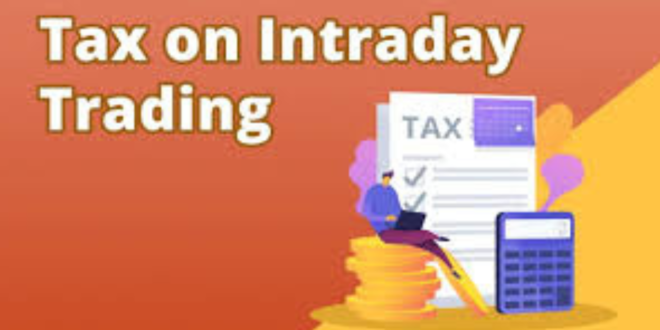Understanding Intraday Trading
Making quick bucks out of the stock markets through intraday trading is appealing to many, but few remember the tax implications of these transactions. Any individual looking to venture into intraday trading must be knowledgeable about income tax on intraday trading. This includes knowing how profits are classified under the Income Tax Act of India, 1961, what are the rates they’re taxed at, and how they alter the investor’s taxable income for the financial year.
Income Tax on Intraday Trading in India
In the context of intraday trading, the phrase ‘Income tax on intraday trading‘ specifically relates to the taxation of profits earned through such operations. These operations, carried out mostly through a Demat account, are classified under ‘Speculative Business Income’ according to section 43 of the Income Tax Act. Hence, if you’re making money from intraday trading, it is necessary to declare your profits in your income tax return under ‘Profits and Gains from Business or Profession (PGBP).’
Role of a Demat Account in Intraday Trading
Among the many financial tools, a Demat account stands as the crucial link between you and the stock market. Essentially, it is an online portfolio, much like a digital bank locker, where shares and securities are held in a dematerialized, i.e., digital, form. Intraday trading refers to a system where you buy and sell the same shares within the same trading day, with the intent of making profits from the price fluctuations. These transactions are typically executed through a Demat account.
Tax Rates and Loss Set-Off Rules for Intraday Trading
Intraday trading profits are taxed at a rate according to the trader’s income bracket, but they can reach up to 30%. However, if the trader incurs a loss, it can be set off against profits from other speculative business income in the same fiscal year. If the loss cannot be completely set off, it can be carried forward for a span of 4 consecutive years, but only against speculative business profits in these years.
Case Study: Tax Calculation for Intraday Trading
To elucidate, let’s say Mr. A has earned ₹1,00,000 from intraday trading in a financial year. As an individual falling under the tax bracket of 30%, His income tax on intraday trading would account to ₹30,000.
Remember, these rules apply only to the salaried or business class, retail investors, or any person who doesn’t trade in the stock market for a living. For those who conduct high volume trades and qualify as traders under the tax laws, the taxation system is wholly different.
It’s also worth mentioning that the aforementioned tax rules and rates are not universal for every kind of stock market gain. Profits from delivery based trades, where shares are bought and kept for a day or more before selling, are considered either short-term capital gains (STCG) or long-term capital gains (LTCG) depending on the holding period. These gains are taxed at different rates and cannot be set off against intraday trading losses.
Additional Costs in Intraday Trading
Moreover, while trading in stocks through your Demat account, remember to consider applicable charges like Security Transaction Tax (STT), brokerage, and other transaction costs. These charges vary according to the kind of trade (intraday/delivery) and they also influence the net profit or loss from your transactions.
Navigating the complex waters of stock trading and its taxation procedures can sometimes feel overwhelming. But it is necessary to stay abreast with the latest regulations in order to calculate the correct income tax on intraday trading. Ignorance on this matter might lead to penalties from the Income Tax department.
Lastly, remember that while the potential for profit can be exciting, stock market investments are inherently risky. Successful intraday trading requires understanding and monitoring the markets, and even then, losses are an inherent part of the game. So, before diving into the world of intraday trading, make sure to do your homework and weigh the pros and cons.
Disclaimer:
Trading in stocks is subject to market risks. Intricacies of taxation related to intraday trading explained in this article are for informational purposes and should not be considered as financial advisory. Investors should consult with a certified financial advisor or tax consultant before making any trading decisions.
 Crypto trade Online Unlock the Future of Finance Today.
Crypto trade Online Unlock the Future of Finance Today.




